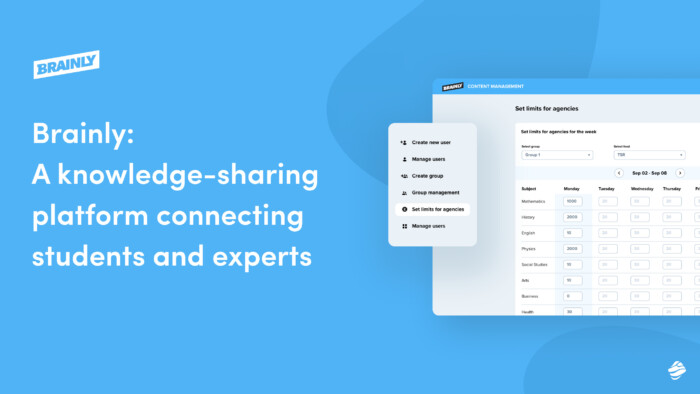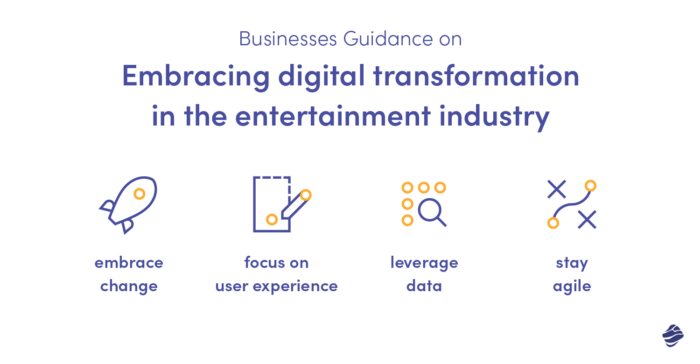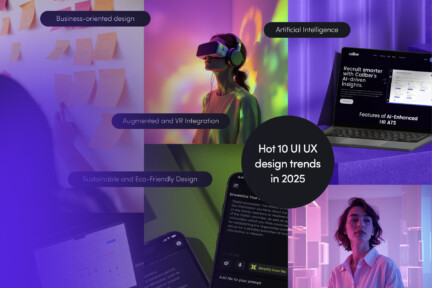Are you ready to enter the vibrant media and entertainment world, where stagnation is not an option? You must embrace digital transformation in 2024 using advanced tech to outshine rivals, understand consumer needs, and revolutionise content.
Curious? You should be.
Here’s a sneak peek at what we’ll dive into in this guide about digital transformation and the media industry:
- The Current Landscape: Where does the industry stand today?
- Tech Innovations: AI, VR/AR, blockchain… the list goes on.
- Consumer Insights: What do they really want?
- Content Strategies: The new playbook.
- Data-Driven Decisions: Make your data work for you.
- Overcoming Challenges: Turning obstacles into opportunities.
- Miquido’s Success Stories: Real-world triumphs.
- Future Digital Transformation Trends: What’s next on the horizon?
- Your Game Plan: Actionable advice for 2024.
P.S. When we are speaking of game-changers, let’s talk about Miquido, too. We aren’t just observers of digital transformation; we’re the maestros orchestrating it. You can explore how Miquido is observing and actively shaping this transformative journey.
The Current Landscape of Digital Transformation in the Media and Entertainment Industry
The media and entertainment industry in 2024 is a kaleidoscope of digital innovation.
The advent of AI-powered services like Netflix and Amazon Prime Video has revolutionised the video streaming industry.
These platforms utilise advanced algorithms and machine learning techniques to predict user preferences and customer behaviour to provide personalised content recommendations.
This enhances the user experience and helps content providers retain their audience by offering them exactly what they want to watch. The power of AI in shaping the future of entertainment cannot be overstated.
This isn’t just a hit-or-miss tactic. According to a report by McKinsey, media companies that leverage AI for customer personalisation see up to a 15% increase in revenue.
Now, let’s talk about practical applications.
- AI isn’t just about recommendations. Tools like IBM Watson are helping scriptwriters analyse and predict audience responses, making content creation an art and a science. Immersive technologies are moving from the fringes to the mainstream.
- Take the example of VR concerts. Nearly 19 per cent of US consumers used VR in 2020, a three percentage point increase from 2019. These technologies are opening new revenue streams in an industry constantly seeking innovative ways to engage audiences.
- For those in the business, data analytics is your secret weapon. Tools like Google Analytics and Tableau can provide deep insights into audience behaviour, helping fine-tune marketing strategies.
But keep in mind data is only as good as its interpretation. Regular training in data literacy for your team can turn raw numbers into actionable insights. - Blockchain technology is another game-changer, especially regarding content monetisation and rights management. The market size for blockchain in media, advertising, and entertainment is expected to grow from USD 0.84 billion in 2023 to USD 15.29 billion by 2028.
- As for 5G, it’s the new backbone of content delivery. 5G technology is set to revolutionise live streaming and high-definition content delivery with a speed up to 100 times faster than 4G.
Digital transformation and media are rapidly evolving industries, so it is essential to stay on top of the latest trends and digital tools.
Emerging Technologies and Their Impact
In 2024, the media and entertainment digital scene is buzzing with new technologies. AI, VR/AR, blockchain, and 5G aren’t just part of a futuristic vision. They are active agents of change, reshaping this dynamic industry.
1) AI: The Creative Break-Through
Artificial Intelligence is now a pivotal part of content creation. More than half of business leaders are already incorporating AI content generation tools into their strategies, with a staggering 73% of executives from both B2B and B2C marketing domains embracing generative AI in their companies.
AI algorithms can analyse viewer data to predict trends and preferences, enabling content that resonates deeply with audiences.
As a result, marketers leveraging AI-powered content generation have decreased their workload by nearly 60%, illustrating AI’s profound impact on efficiency.
2) VR/AR: Crafting Immersive Worlds
Virtual and Augmented Reality technologies are transforming user experiences. By 2026, the market size of AR and VR will reach over a hundred billion dollars, a significant increase from the $29.69 billion it reached in 2022.
From VR concerts to AR gaming experiences, these technologies offer unparalleled engagement. The number of VR and AR devices shipped out is expected to soar to 32.76 million in 2024, indicating their increasing demand and potential.
3) Blockchain: Securing Content’s Future
As content monetisation and rights management become more important, blockchain technology is emerging as a key player.
A major shift toward secure and efficient rights management is expected to occur by 2028 as the blockchain market for media and entertainment grows from $0.84 billion to $15.29 billion.
4) 5G: Fueling Connectivity and Innovation
The expansion of 5G networks promises increased connectivity speed, lower network latency, and innovative approaches to content delivery.
Media and entertainment are expected to benefit from 5G services for approximately $1.87 trillion by 2030. Media and entertainment are expected to benefit from 5G services in the amount of approximately $1.87 trillion by 2030.
In this rapidly evolving landscape, staying ahead means embracing these technologies.
Pro Tip: Subscribe to industry newsletters, join webinars, and engage in continuous learning to remain at the forefront of innovation. In the domain of digital transformation in the media and entertainment industry, agility and knowledge are your most valuable assets.
Consumer Behavior and Expectations
As 2024 unfolds, consumer behaviour in the media and entertainment industry is transforming significantly. The increased number of digital media platforms has led to a paradigm shift in consumer expectations.
Today’s audience seeks content that is engaging, high-quality, personalised, and accessible across multiple devices.
- One of the most notable changes is the demand for on-demand content. Viewers now prefer streaming services that offer flexibility in what, when, and where they watch. This shift has led to the decline of traditional media streaming platforms and the rise of platforms like Netflix and Hulu.
- Another key trend is the growing appetite for interactive and immersive content. Users are no longer passive consumers; they want to be part of the story. This is where technologies like VR and AR come into play, offering new ways to experience content.
How Is Miquido Keeping Up with this Evolution? Miquido develops solutions that prioritise user experience and engagement. Their AI-driven platforms enable content personalisation, ensuring each user’s experience is tailored to their preferences.
Additionally, Miquido’s expertise in mobile app development ensures content is accessible and optimised for various devices, catering to the modern viewer’s need for mobility and flexibility.
Content Strategies for Digital Transformation
The entertainment digital transformation has also led to new content creation, distribution, and monetisation models. Content creators are now exploring ways to leverage digital platforms for distribution and as a primary medium for storytelling.
One innovative model is the use of social media integration as a content platform. Creators turn to Instagram, TikTok, and YouTube to reach audiences directly, bypassing traditional channels to create digital content.
These platforms offer unique opportunities for engagement and monetisation, such as sponsored content and advertising revenue.
Miquido’s Innovative Approach: Miquido recognises these shifts and helps clients adapt their content strategies accordingly. Additionally, Miquido’s expertise in blockchain development enables secure and efficient monetisation models, ensuring creators are fairly compensated for their work.
The Power of Analytics in Personalization and Engagement
In this fast-paced media and entertainment world, data-driven decision-making has become crucial.
Because it’s not just about collecting data; it’s about turning that data into actionable insights. Personalisation and engagement are at the heart of this strategy. Companies can tailor content and marketing strategies to individual users by analysing user interactions, preferences, and behaviours, enhancing engagement and loyalty.
How does Miquido Harness the power of data analytics? Miquido excels in it. Our approach uses sophisticated algorithms to analyse large datasets, providing clients with deep insights into their audience.
This capability allows for highly targeted content and marketing strategies that resonate with viewers. For instance, by analysing viewing patterns, Miquido can help clients identify which types of content are most likely to keep audiences engaged and coming back for more.
Challenges in Digital Transformation in the Media Industry
Despite the benefits and opportunities, digital transformation in the media industry has challenges. One of the primary obstacles is keeping pace with rapidly evolving technologies and consumer trends.
Another challenge is integrating new digital solutions with existing systems and workflows, which can be complex and resource-intensive.
Navigating the Obstacles with Miquido: Miquido addresses these challenges by offering comprehensive, end-to-end digital transformation services. The Miquido experts help clients solve the complexities of integrating new technologies, ensuring a seamless transition. You also get ongoing support and training, helping clients stay up-to-date with digital trends and technologies.
Additionally, Miquido’s focus on custom solutions ensures that their services are personalized to meet the unique needs and challenges of each client.
Case Studies of Successful Digital Transformation
Miquido’s portfolio showcases numerous success stories about digital transformation in the media and entertainment industry. Here are some success stories for you to get the feel of what kind of work does Miquido do:
1) HerbalifeGO
HerbalifeGO is an innovative app developed by Miquido that streamlines the process of ordering Herbalife products, planning meal schedules, and monitoring fitness results. It serves as an all-in-one solution for managing diet and fitness regimes.

Development and Features:
- Miquido developed HerbalifeGO in just 6 months, enabling Herbalife to showcase their app at their annual Extravaganza event.
- The services provided included Design, Mobile UX/UI, Backend Development, and a CMS.
- The tech stack used for the project included Android, iOS, AWS ECS (Fargate), AWS CloudFormation, AWS Elastic Beanstalk, AWS Elasticsearch Service, and AWS Lambda.
Impact and Results:
- The app facilitated 56 localised catalogues of products, catering to a global audience.
- HerbalifeGO achieved over 50,000 downloads on Google Play.
2) Brainly
Brainly, a knowledge-sharing community platform, connects 150 million students and experts to solve challenging homework questions.

Solution Development:
- Miquido created the Brainly Content Tool, a web platform for managing answer requests on Brainly. This solution addressed the distribution of tasks and optimised the workload for answer providers.
- The Content Tool was developed in 3 months, featuring an effective arrangement of expert responses, easy time tracking, and workflow monitoring features.
Services and Technology:
- The services included Proof of Concept (PoC), Web Development (Backend, Frontend), and Web Design.
- The tech stack encompassed Golang and React.
Outcomes:
- This development led to 50% of questions on Brainly being answered within 24 hours.
- The benefit rate achieved was twice higher than the targeted goal.
- The solution saved an average of 3 hours of weekly work time for each user.
These case studies exemplify Miquido’s proficiency in entertainment app development, delivering tailored solutions that significantly impact their clients’ operational efficiency, and customer engagement.
Future Trends for 2024 About Digital Transformation in the Media Industry
The media and entertainment sector is poised for groundbreaking innovations. We can expect further AI and machine learning integration in content personalisation and predictive analytics, aiding in decision-making processes from content development to distribution.
Virtual reality is set to become more mainstream, with advancements in technology making VR content more accessible and affordable. This could revolutionise how audiences consume media, offering more immersive and interactive experiences.
How’s Miquido Keeping Up with this Evolution? As for Miquido’s vision, we foresee a future where technology seamlessly blends with creative content. Our focus is on developing solutions that are both technologically advanced and user-centric, ensuring that technology enhances, rather than overshadows, the creative aspect of media and entertainment.
Furthermore, Miquido monitors the development of blockchain technology and its potential to disrupt traditional content monetisation business models. We are exploring incorporating blockchain to provide more secure and transparent content distribution and rights management.
Guidance for Media Businesses
In the digital transformation era, media and entertainment businesses need to adapt swiftly to stay competitive. Here’s some actionable advice:
- Embrace Change: The first step is to be open to change. This means not just adopting new digital technologies but also rethinking your business model to align with digital advancements.
- Focus on User Experience: In today’s digital landscape, user experience is king. Invest in technologies that enhance interaction and personalisation. Remember, a satisfied user is more likely to become a loyal customer.
- Leverage Data Wisely: Utilize data analytics to understand your audience better. This will help you make informed decisions that resonate with your audience’s evolving preferences.
- Stay Agile: Be prepared to adapt to new trends rapidly. This agility is crucial in an industry that evolves at a breakneck pace.
Why Partner with Miquido? Partnering with Miquido can significantly smooth your digital transformation journey. Our expertise in emerging technologies and user-centric approaches ensures that digital solutions are innovative and aligned with your business goals. With Miquido, you’re not just implementing technology but strategically integrating it to enhance your content and connect with your audience effectively.

Ready to Embrace the Digital Wave? Let’s Do it with Miquido.
As we surf through the tides of digital transformation in the media and entertainment industries, it’s clear that the future is bright and brimming with possibilities. So, as the article ends, you’ve journeyed through the landscape of 2024, where technology and creativity merge to redefine the media and entertainment companies.
Hence, the key takeaways for you are:
- The rise of AI, VR/AR, blockchain, and 5G is reshaping media and entertainment.
- Consumer behaviour favours personalisation, interactivity, and flexibility.
- Data-driven decision-making is crucial for success.
- Miquido’s expertise helps navigate the challenges of digital transformation.
- Future trends point toward more immersive and interactive content experiences.
In the hassled digital marketplace, standing out requires innovation and strategic partnerships. Miquido is more than a technology provider. It is a visionary partner that guides clients through the digital landscape with expertise and creativity.
By partnering with Miquido, you’re not just adapting to change; you’re leading it, crafting experiences that resonate with tomorrow’s audience.
How does digital transformation affect media and entertainment organisations?
Digital transformation revolutionises how content is created, distributed, and consumed. It introduces new technologies like AI and VR/AR, leading to more advertising and personalised content. This transformation also enables more efficient content delivery and monetisation strategies, reshaping the industry’s business models and audience engagement approaches in media companies.
What is digital transformation in the media sector?
Digital transformation refers to integrating digital technology into all media operations in the media sector. It involves tools like data analytics for audience insights, blockchain for secure transactions, and emerging technologies for innovative content delivery. This transformation involves adapting to changing consumer behaviours and creating more engaging and dynamic media experiences.
What are the 4 main areas of digital transformation?
These are the four main areas of digital transformation:
Technology Integration: Implementing advanced technologies like AI, blockchain, and 5G.
Data Optimization: Leveraging data analytics for strategic decision-making and personalisation.
Process Automation: Streamlining operations for efficiency and effectiveness.
Customer Experience Enhancement: Focusing on user-centric strategies to improve engagement and satisfaction.
How is digital technology used in entertainment?
Digital technology in entertainment is used for creating immersive experiences (through VR/AR), offering personalised content (via AI algorithms), streamlining production processes (with digital tools), and improving distribution and monetisation (through platforms like streaming services and blockchain-based systems).
What are the different types of media transformation?
Different types of media transformation include:
Digitisation of Content: Converting traditional media into digital formats.
Interactive Media: Creating content that allows user interaction, like games and VR experiences.
Cross-platform Media: Distributing content across various digital platforms.
Social Media Integration: Leveraging social platforms for content distribution and audience engagement.
Mobile-centric Media: Tailoring content for mobile devices to reach a wider audience.





![[header] 10 most popular entertainment mobile apps in 2025](https://www.miquido.com/wp-content/uploads/2025/05/header-10-most-popular-entertainment-mobile-apps-in-2025-432x288.jpg)




